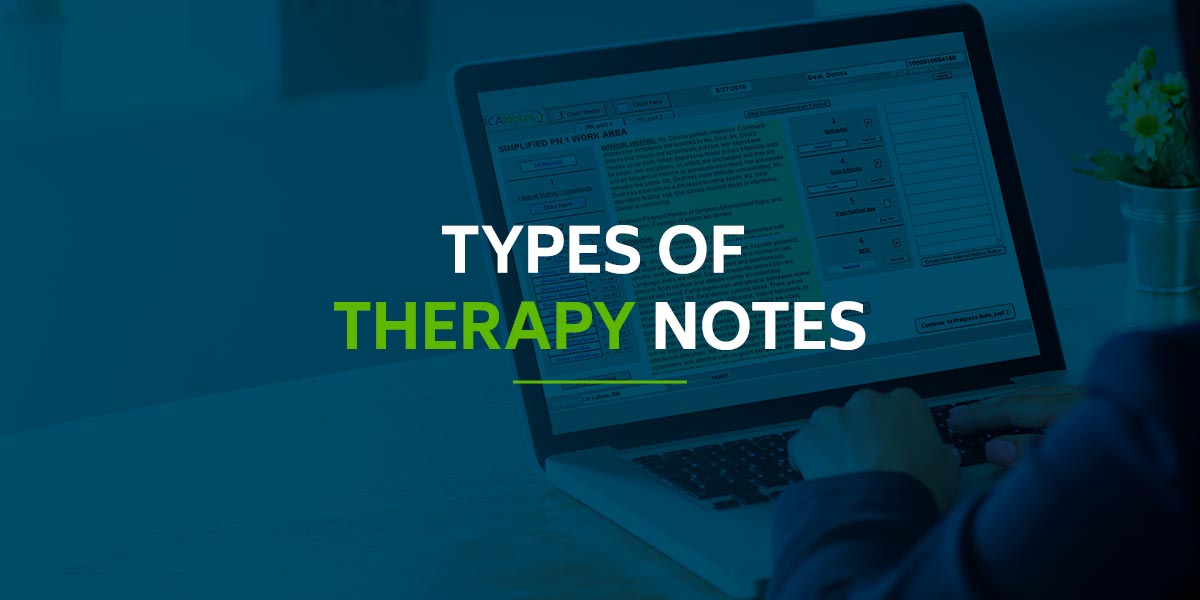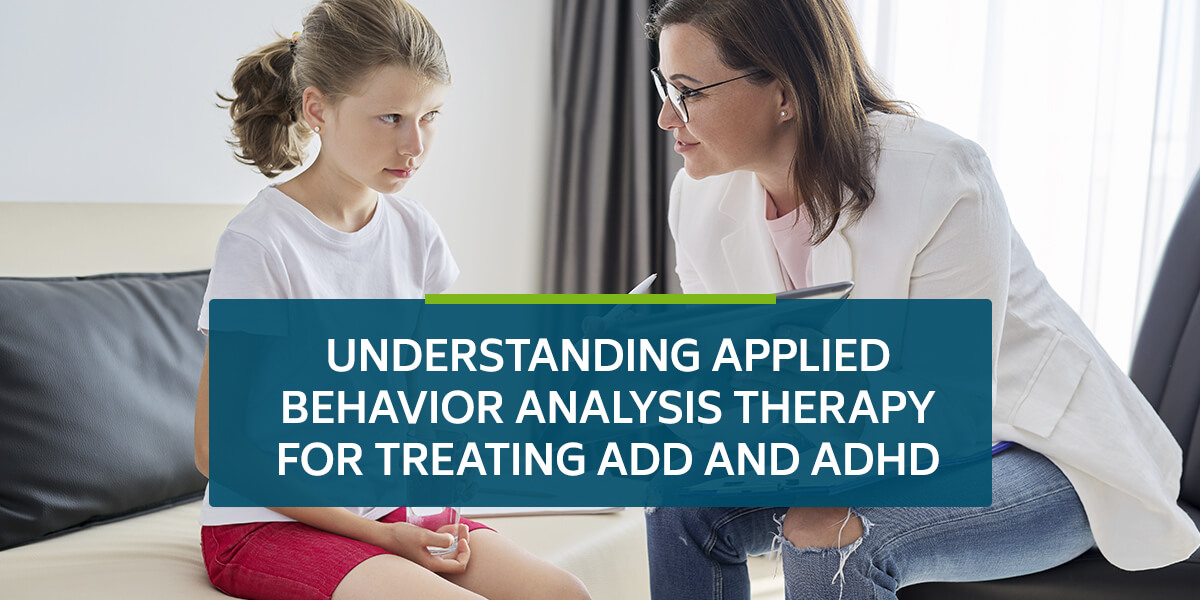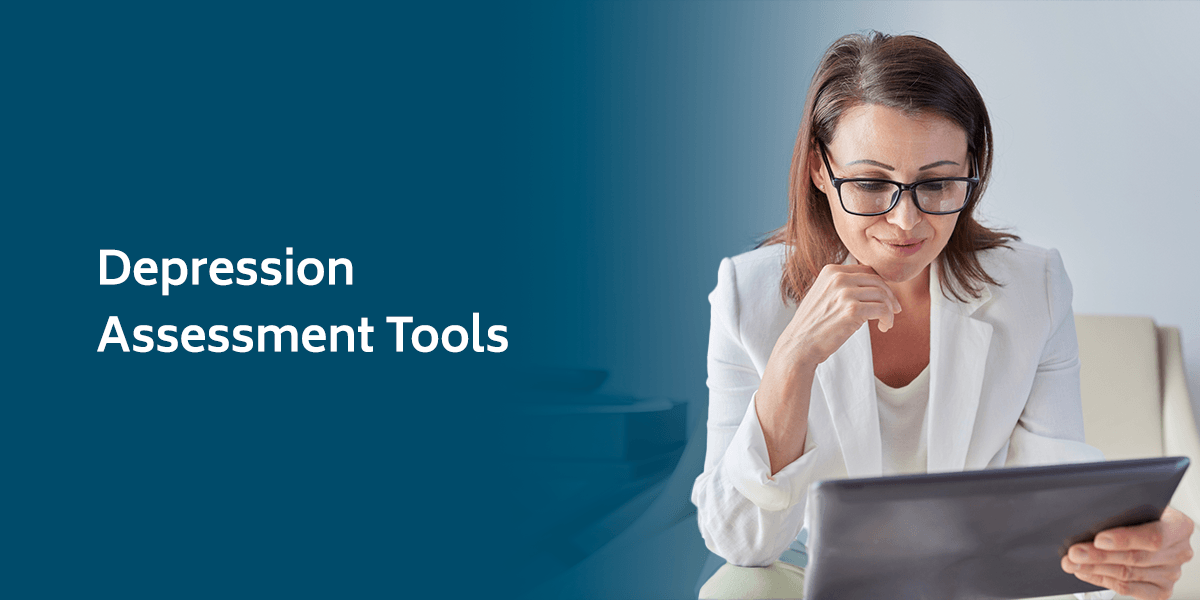
Depression Assessment Tools
One of the most crucial components of evidence-based practice is making careful, accurate assessments and diagnoses. No matter what behavioral health disorder your patient may have, it's critical to perform initial and periodic assessments to gauge their progress and determine if you need to adjust treatment.
However, identifying the signs of depression in your patients can sometimes be challenging because not everyone exhibits the same symptoms. With depression assessment tools, you can ensure you're developing an accurate assessment and diagnosis of depression for your patient and getting them the treatment they need. In this post, we'll discuss clinical depression assessment tools and the benefits they offer behavioral health professionals.
Download our Behavioral Health Assessment Guide
Find out which assessments are valid, research-verified, and completely free to use.
Signs, Symptoms, and Effects of Depression
As of 2021, about 5% of adults and 5.7% of older adults worldwide live with depression, which translates into hundreds of millions of people. Depression also affects nearly 2.4 million children. By these numbers alone, we can see that depression can exist in anyone, no matter how young or old they are, and drastically change their lives. Untreated depression can lead to even more severe side effects and risky behaviors.
Let's break down some signs, symptoms, and effects of depression in children, adults, and older adults. Remember that not everyone will display these, and everyone will express them to different degrees of severity. Because depression is a mood disorder that significantly affects the way people think and feel, it's likely some of your patients may show various emotional and physical problems. Some patients may also be more high-functioning than others.
In Children and Teens
Some common signs of depression in young children and teenagers are similar to those of adults, but there are some slight differences.
In young children, you may see symptoms like:
- Worry
- Sadness
- Clinginess
- Being underweight
- Refusing to go to school
- Physical ailments or pains
In teenagers, you may see symptoms like:
- Sadness
- Irritability
- Anger
- Poor performance in school
- Feeling worthless or negative
- Being extremely sensitive
- Overeating or oversleeping
- Avoidance of social activities
- Loss of interest in hobbies
- Engaging in drugs or alcohol
In Adults
For some people with depression, symptoms can become severe enough to prevent your patient from completing their daily responsibilities, such as going grocery shopping, cleaning their home or practicing proper hygiene. As with other mental health disorders, such as anxiety, people can experience multiple episodes or a prolonged period of depression.
In adults, symptoms of depression include:
- Restlessness or agitation
- Trouble concentrating or making decisions
- Difficulty remembering things
- Anxiety or increased anxiety
- Lack of energy
- Loss of interest in normal activities
- Reduced appetite or unintentional weight loss or weight gain
- Insomnia or other sleep disturbances
- Irritability and frustration
- Angry outbursts
- Suicidal thoughts
- Unexplained physical problems
In Other Adults
Though some older people may become more isolated and lonely as they grow older and develop depression, it isn't something to take lightly. Untreated depression in older adults can be just as damaging as in teenagers and younger adults.
In older adults, symptoms of depression include:
- Physical pain and body aches
- Suicidal thoughts or feelings of helplessness
- Personality changes
- Memory difficulties
- Fatigue, loss of appetite, or sleep problems not caused by medication or a medical condition
- Wanting to stay home instead of socializing with others
What are Depression Assessment Tools?
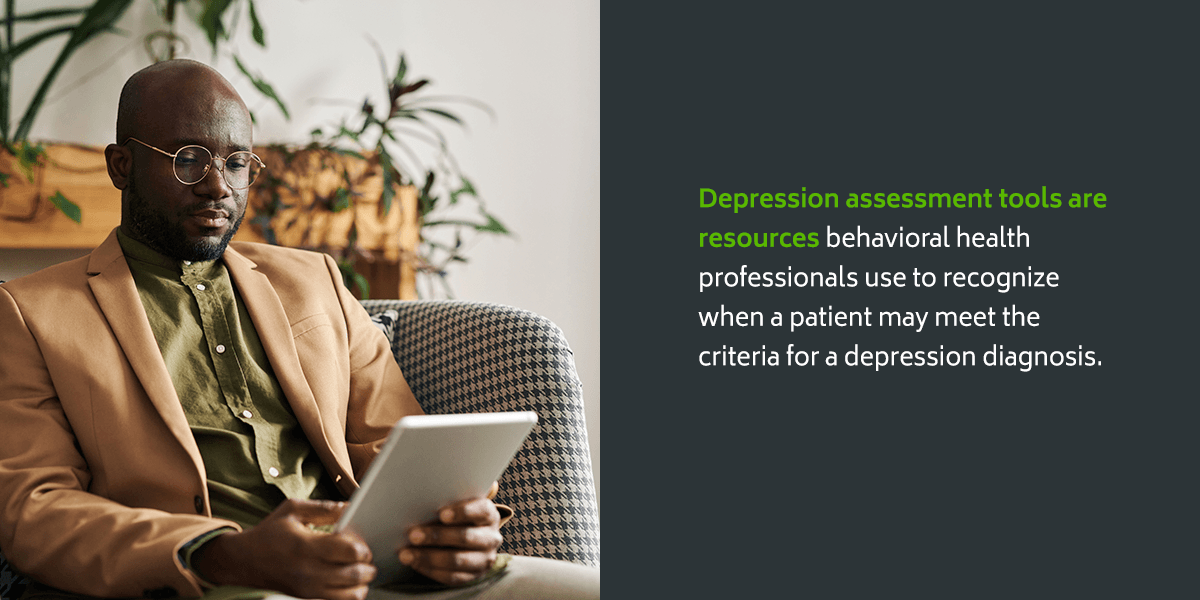
Depression assessment tools are resources behavioral health professionals use to recognize when a patient may meet the criteria for a depression diagnosis. These may sometimes act as a checklist for clinicians to determine if a patient may benefit from depression treatment rather than other types of counseling.
Depression assessment tools are similar to other mental health assessment tools, except they specifically target depression symptoms. These resources make it easier for professionals to direct their sessions and treatment plan to meet a patient's specific needs. For instance, the Zung Self-Rating Depression Scale asks people how strongly they agree with statements like "I feel downhearted and blue" and “I get tired for no reason,” which are leading hallmarks of depression.
Benefits of Depression Assessment Tools for Clinicians
While the primary goal of depression assessment tools is to help behavioral health professionals accurately test and treat their patients, there are many other benefits to using these tools. Depression screening tools are often the first step to determining a specific disorder in a new patient. For example, if you have a new patient who has a family history of depression, a depression assessment tool can help provide a more definitive answer.
These tools can also help patients reflect on their thoughts, feelings, and behaviors and discuss things they may not have considered part of their depression. For example, physical discomfort and memory issues are lesser-known side effects of adult depression. Awareness of these can help people understand their day-to-day difficulties and allow them to engage more fully with their treatment.
Additionally, depression assessment tools can help you and other clinicians accurately diagnose different patient demographics, such as children and older adults. For instance, a young child may not understand what's happening to them or know how to describe their symptoms like an adult can, so they'll need an assessment tool that works for them.
Finally, using depression assessment tools can significantly reduce documentation time, which already takes up a large portion of clinicians' days. One survey found that if a behavioral health specialist had about 18 clients per week, they would spend an average of 10 hours a month on note-writing tasks. Using these assessment tools can allow you to arrive at a diagnosis and treatment plan more efficiently without going back and forth between sessions to determine if your patient has completed the appropriate screenings.
Benefits of Depression Assessment Tools for Clinicians
There are hundreds of mental health assessment tools available for behavioral health professionals. Clinicians who specialize in treating depression can use these for children, teenagers, adults and older adults who experience various symptoms and severity. Let's take a look at some of the most common assessment tools for depression.
Instant Webinar
Write Better Biopsychosocial Assessments
Download this informative webinar to learn about the power of the biopsychosocial evaluation framework and how to incorporate it into your initial assessment process and documentation.
You'll Learn
- How to apply a competency-based assessment model to understand an individual's past and interpret presenting issues.
- How to use an ecological perspective to examine the complex interactions between clients and their environments.
- How using an electronic medical record system can support writing a more comprehensive biopsychosocial assessment in less time, allowing you to devote your time and attention to treating clients.
Types of Depression Assessment Tools
There are hundreds of mental health assessment tools available for behavioral health professionals. Clinicians who specialize in treating depression can use these for children, teenagers, adults and older adults who experience various symptoms and severity. Let's take a look at some of the most common assessment tools for depression.
Hamilton Depression Rating Scale
The HAM-D, also known as the HDRS, aims to measure depression severity in adults before, during and after their treatment. With this tool, behavioral health professionals can identify depression and evaluate their progress and recovery.
This test contains 21 items related to mood, anxiety, insomnia, weight loss, feelings of guilt and somatic symptoms, but only scores patients based on the first 17 questions, measured on either a three-point or five-point scale. The HAM-D questionnaire takes about 20 minutes to complete and score.
Center for Epidemiologic Studies Depression Scale
Since the 1970s, professionals in primary care settings have used the CES-D to screen the general population for depression. This test includes 20 self-report questions measured on a four-point scale. These items aim to evaluate the major dimensions of depression someone has experienced within the last week.
Clinicians can use this well-known assessment tool on children as young as 6 years old up to those in older adulthood. This test takes about 20 minutes to complete and score and has proven to be consistently reliable and valid.
Major Depression Inventory
The MDI is a self-rating questionnaire people can use to answer various questions on a scale ranging from “all the time” to “at no time.” This depression assessment tool aims to determine the frequency of symptoms a patient has experienced over the last two weeks. The scores will help behavioral health professionals evaluate the severity of a respondent's symptoms.
Patient Health Questionnaire for Adolescents
The PHQ-A is one of the most common depression assessment tools used for children in the United States. Though this test was originally for adults, clinicians have since modified it for adolescents. This questionnaire asks children and teens about various symptoms, including lack of sleep, abnormal appetite or lack thereof, suicidal thoughts, problems concentrating, and lack of energy.
The PHQ-A scores the severity of these symptoms based on how often a respondent experiences them, which can range from zero to 27. To receive a depression diagnosis, people must score a minimum of five and have symptoms for at least two weeks.
Some other widely used depression assessment tests that cover a wide range of ages include:
- Children's Functional Assessment Rating Scale
- Columbia Depression Scale
- Geriatric Depression Scale
- Depression Anxiety Stress Scale
Learn More About Our Depression Assessment Tools
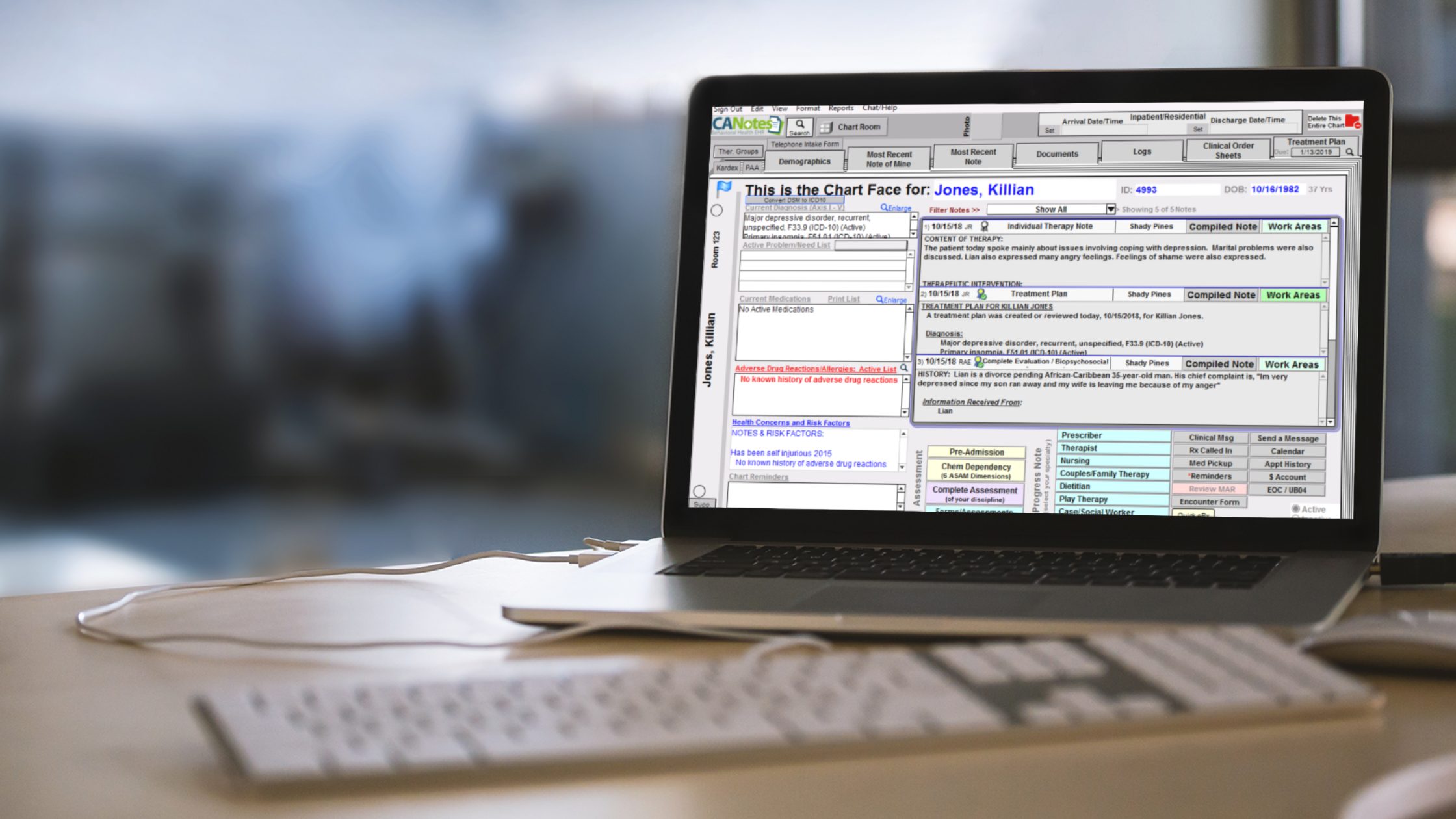
As a therapist, counselor, or behavioral health professional, you already have so many responsibilities on your plate. From finding time to document your session notes, spending time with patients, and dealing with insurance companies, it's easy to see why you might benefit from depression assessment tools. With ICANotes, you can access over 75 rating scales and assessment tools to help you focus on your patients and spend less time typing.
With these resources, you can make better-informed decisions regarding diagnoses, treatment, and overall progress for your patients to help you provide the best care possible. Our comprehensive, intuitive EHR system also offers many other features, such as mental health therapy notes and charting solutions. Contact us today to learn more about our depression screening and assessment tools and other mental health therapy note templates.





